Related Research Articles

The Crystals are an American vocal group that originated in New York City. Considered one of the defining acts of the girl group era in the first half of the 1960s, their 1961–1964 chart hits – including "There's No Other ", "Uptown", "He's Sure the Boy I Love", "He's a Rebel", "Da Doo Ron Ron" and "Then He Kissed Me"– featured three different female lead singers and were all produced by Phil Spector. The latter three songs were originally ranked number 263, number 114, and number 493, respectively, on Rolling Stone magazine's list of The 500 Greatest Songs of All Time. However, two songs were omitted from the magazine's 2010 update, leaving only "He's a Rebel" at number 267. In the 2021 update, "Da Doo Ron Ron" was added back to the list at number 366.
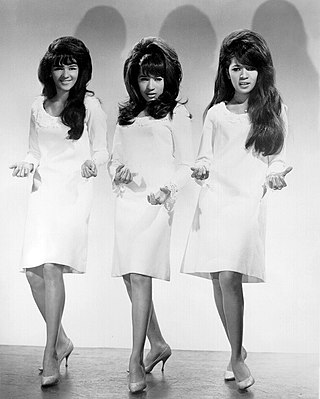
The Ronettes were an American girl group from Washington Heights, Manhattan, New York City. The group consisted of lead singer Veronica Bennett, her older sister Estelle Bennett, and their cousin Nedra Talley. They had sung together since they were teenagers, then known as "The Darling Sisters". Signed first by Colpix Records in 1961, they moved to Phil Spector's Philles Records in March 1963 and changed their name to "The Ronettes".
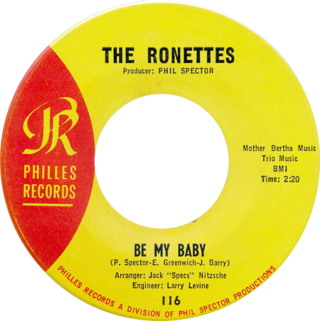
"Be My Baby" is a song by American girl group the Ronettes that was released as a single on Philles Records in August 1963. Written by Jeff Barry, Ellie Greenwich, and Phil Spector, the song was the Ronettes' biggest hit, reaching number 2 in the U.S. and number 4 in the UK. It is often ranked as among the best songs of the 1960s, and it is regarded by some as one of the greatest songs of all time.
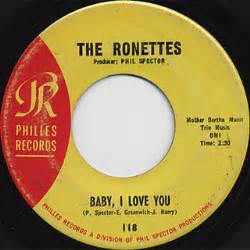
"Baby, I Love You" is a song originally recorded by the Ronettes in 1963 and released on their debut album Presenting the Fabulous Ronettes (1964). The song was written by Jeff Barry, Ellie Greenwich, and Phil Spector, and produced by Spector.

"Don't Worry Baby" is a song by American rock band the Beach Boys from their March 1964 album Shut Down Volume 2. Written by Brian Wilson and Roger Christian, Wilson's lead vocal on the track is considered one of his defining performances, and he later referred to "Don't Worry Baby" as perhaps the Beach Boys' finest record. It was issued in May 1964 as the B-side of "I Get Around", and charted separately at number 24.

"Do You Want to Dance" is a song written by American singer Bobby Freeman and recorded by him in 1958. It reached number No. 5 on the United States Billboard Top 100 Sides pop chart and No. 2 on the Billboard R&B chart. Cliff Richard and the Shadows' version of the song reached No. 2 in the United Kingdom in 1962, despite being a B-side. The Beach Boys notably covered the song in 1965 for their album The Beach Boys Today!. Retitled "Do You Wanna Dance?", their version reached No. 12 in the United States. A 1972 cover by Bette Midler with the original title restored reached No. 17.

"Please Let Me Wonder" is a song by the American rock band the Beach Boys from their 1965 album The Beach Boys Today!. Written by Brian Wilson and Mike Love, it was the first song Wilson wrote under the influence of marijuana. The lyrics are about a man who does not know if a girl loves him and is afraid of learning the answer, and so he prefers to fantasize that she does. On February 15, the song was issued as the B-side to their "Do You Wanna Dance?" single before the album's release.
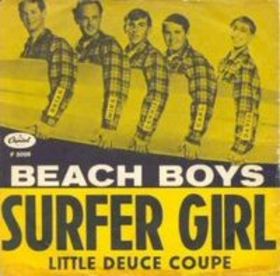
"Surfer Girl" is a song by American rock band the Beach Boys from their 1963 album Surfer Girl. Written and sung by Brian Wilson, it was released as a single, backed with "Little Deuce Coupe", on July 22, 1963. The single was the first Beach Boys record to have Brian Wilson officially credited as the producer.

"She Knows Me Too Well" is a song written by Brian Wilson and Mike Love for the American rock band The Beach Boys, about a man who is engrossed and obsessed in his own jealousy and insecurity. It was released on the 1965 album The Beach Boys Today!, initially serving as the B-side of their "When I Grow Up " single in 1964. It was one of the first songs that Brian wrote while under the influence of marijuana.
"Girl Don't Tell Me" is a song written by Brian Wilson for the American rock band the Beach Boys, released on July 5, 1965, on the album Summer Days . It was later included as the B-side of the group's single "Barbara Ann", which was released on December 20, 1965.
"Barbara Ann" is a song written by Fred Fassert that was first recorded by the Regents as "Barbara-Ann". Their version was released in 1961 and reached No.13 on the Billboard Hot 100 chart. The more famous version was recorded by the Beach Boys for their 1965 in-house live album Beach Boys' Party! In December, "Barbara Ann" was issued as a single with the B-side "Girl Don't Tell Me", peaking at No. 2 in the U.S. and No. 3 in the UK. The Regents' original version was featured in the 1973 film American Graffiti and later included on the soundtrack album.

"The Little Girl I Once Knew" is a song by the American rock band the Beach Boys that was issued as a standalone single on November 22, 1965. Written and produced by Brian Wilson, it was recorded during the making of the band's 1966 album Pet Sounds.

"I Do" is a song written by Brian Wilson and Roger Christian, originally released as a single by American vocal group the Castells in March 1964. The recording was also produced and arranged by Wilson. The song's lyrics illustrate a young man getting ready for marriage. Its melody was derived from "County Fair", a song Wilson had earlier written for the Beach Boys.

"It's My Party" is a song by American singer-songwriter Lesley Gore from her debut studio album I'll Cry If I Want To (1963). It was released as the lead single from the album on April 5, 1963, by Mercury Records. The song was collectively written by Herb Wiener, John Gluck Jr., and Wally Gold, while production was helmed by Quincy Jones.

"Da Doo Ron Ron (When He Walked Me Home)" is a song written by Jeff Barry, Ellie Greenwich and Phil Spector. It first became a popular top five hit single for the American girl group the Crystals in 1963. American teen idol Shaun Cassidy recorded the song in 1977 and his version hit number one on the Billboard Hot 100 chart. There have also been many other cover versions of this song, including one by the songwriters Jeff Barry and Ellie Greenwich themselves, performing as the Raindrops.

"Then He Kissed Me" is a song written by Phil Spector, Ellie Greenwich and Jeff Barry. The song, produced by Spector, was initially released as a single on Philles Records (#115) in July 1963 by The Crystals. The lyrics are a narrative of a young woman's encounter, romance, and eventual engagement with a young man.
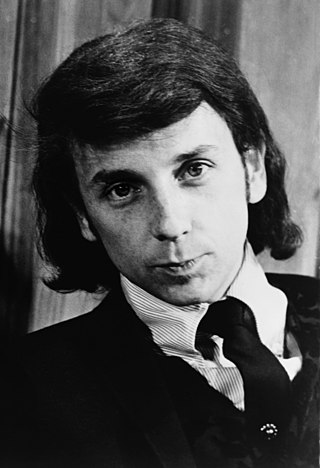
Harvey Phillip Spector was an American record producer and songwriter best known for his innovative recording practices and entrepreneurship in the 1960s and his two trials and conviction for murder in the 2000s. Spector developed the Wall of Sound, a production style that is characterized for its diffusion of tone colors and dense orchestral sound, which he described as a "Wagnerian" approach to rock and roll. He is widely regarded as one of the most influential figures in pop music history and one of the most successful producers of the 1960s.
"Is This What I Get for Loving You?" is a pop song written by Phil Spector, Carole King and Gerry Goffin and recorded by 1960s girl group The Ronettes. The song featured Ronettes lead singer Ronnie Spector on lead vocals, and Ronettes Nedra Talley and Estelle Bennett on backing vocals. Released on Philles Records, reaching No. 75 on the Billboard Hot 100 in 1965.

"Why Don't They Let Us Fall in Love" is a song written by Phil Spector, Ellie Greenwich, and Jeff Barry. It was first recorded by American singer Ronnie Spector, who was credited as Veronica. In 1964, it was released as an A-sided single backed with "Chubby Danny D". It did not chart.
"Uptown" is a 1962 single by the Crystals. On the Cash Box Top 100, the song peaked at #10. On the Billboard charts, "Uptown" reached #13 on the Billboard Hot 100 and #18 on the Billboard R&B Sides chart.
References
- ↑ Musso, Anthony P. (2007). Setting the Record Straight. AuthorHouse. p. 150. ISBN 9781425959869 . Retrieved 17 July 2017.
- ↑ "CashBox Record Reviews" (PDF). Cash Box. November 20, 1965. p. 12. Retrieved 2022-01-12.